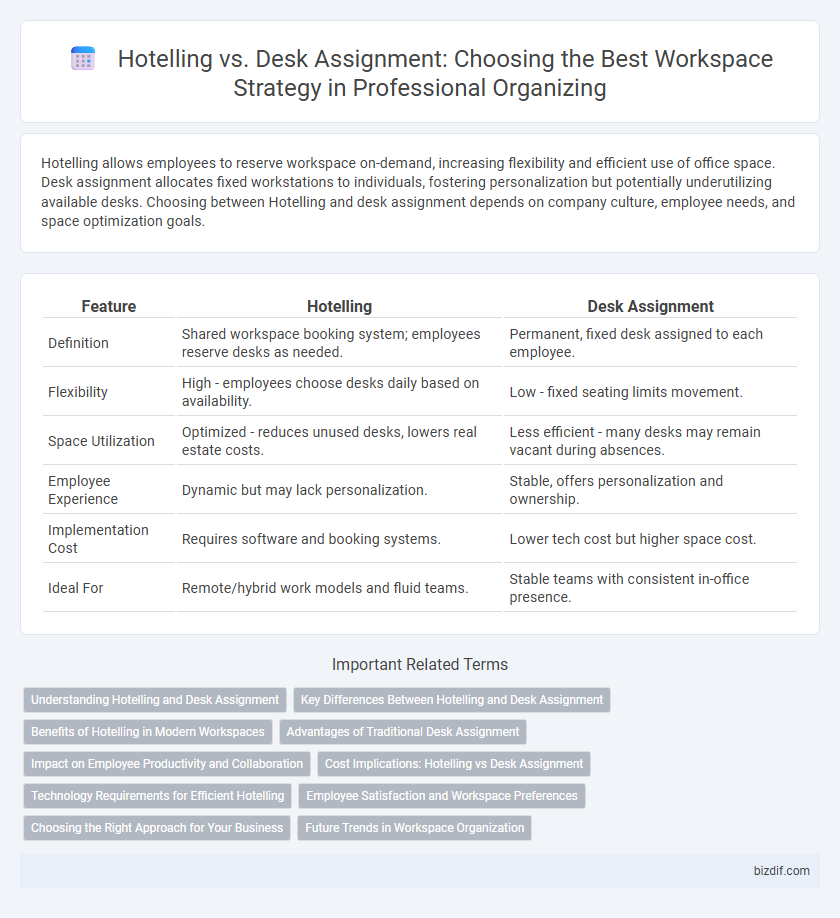Hotelling allows employees to reserve workspace on-demand, increasing flexibility and efficient use of office space. Desk assignment allocates fixed workstations to individuals, fostering personalization but potentially underutilizing available desks. Choosing between Hotelling and desk assignment depends on company culture, employee needs, and space optimization goals.
Table of Comparison
| Feature | Hotelling | Desk Assignment |
|---|---|---|
| Definition | Shared workspace booking system; employees reserve desks as needed. | Permanent, fixed desk assigned to each employee. |
| Flexibility | High - employees choose desks daily based on availability. | Low - fixed seating limits movement. |
| Space Utilization | Optimized - reduces unused desks, lowers real estate costs. | Less efficient - many desks may remain vacant during absences. |
| Employee Experience | Dynamic but may lack personalization. | Stable, offers personalization and ownership. |
| Implementation Cost | Requires software and booking systems. | Lower tech cost but higher space cost. |
| Ideal For | Remote/hybrid work models and fluid teams. | Stable teams with consistent in-office presence. |
Understanding Hotelling and Desk Assignment
Hotelling is a flexible workspace management strategy where employees reserve desks only when needed, optimizing office space utilization by reducing fixed seating. Desk assignment involves allocating specific desks to employees permanently, promoting consistency but often leading to underused or inefficient space. Understanding the differences between Hotelling and Desk assignment helps organizations balance flexibility, employee preferences, and operational efficiency in professional office environments.
Key Differences Between Hotelling and Desk Assignment
Hotelling involves reserving workspaces on an as-needed basis, allowing employees to book desks remotely through a digital system, promoting flexibility and efficient use of office space. Desk assignment refers to permanently assigning specific desks to individual employees, offering personalized workspace but potentially leading to underutilized areas. The key differences lie in workspace flexibility, booking process, and space utilization efficiency, with hotelling supporting dynamic allocation and desk assignment emphasizing consistency.
Benefits of Hotelling in Modern Workspaces
Hotelling enhances space efficiency by allowing employees to reserve desks only when needed, reducing the overall office footprint and lowering real estate costs. It supports flexible work arrangements, fostering collaboration and adaptability in dynamic office environments. Implementing hotelling improves resource utilization and employee mobility, aligning with the needs of modern, hybrid workforce models.
Advantages of Traditional Desk Assignment
Traditional desk assignment offers employees a fixed workspace, fostering a sense of ownership and stability that can boost productivity in professional organizing environments. Consistent desk locations streamline access to personal tools and materials, minimizing time spent searching and enhancing workflow efficiency. This stability also promotes stronger team dynamics by encouraging regular face-to-face interactions and collaboration among colleagues.
Impact on Employee Productivity and Collaboration
Hotelling allows employees to reserve workspaces as needed, promoting flexibility and reducing office real estate costs, which can enhance individual productivity by providing employees with tailored environments. Desk assignment offers consistent, personal workstations that support routine and stability, fostering deeper collaboration through predictable seating arrangements and easier face-to-face interactions. Balancing hotelling and desk assignment strategies can optimize both employee productivity and team collaboration by aligning workspace allocation with diverse workstyles and collaboration needs.
Cost Implications: Hotelling vs Desk Assignment
Hotelling reduces office space costs by enabling flexible use of desks, minimizing the number of workstations needed and lowering real estate expenses. Desk assignment involves fixed seating, increasing the total square footage required and resulting in higher overhead costs for maintenance and utilities. Companies adopting hotelling can optimize resource allocation, leading to significant savings on facility management budgets.
Technology Requirements for Efficient Hotelling
Efficient hotelling in professional organizing relies heavily on advanced technology requirements such as cloud-based reservation systems, real-time desk availability tracking, and integrated communication platforms to streamline workspace management. Mobile applications and IoT sensors enable employees to easily locate and book desks, optimizing space utilization while reducing administrative overhead. Seamless integration with calendar tools and access control systems ensures a frictionless user experience, promoting productivity and flexibility in dynamic office environments.
Employee Satisfaction and Workspace Preferences
Hotelling offers employees flexible workspace options, enhancing satisfaction by allowing choice based on daily needs and promoting a sense of autonomy. Desk assignment provides consistency and personal space, which appeals to those who prefer stability and personalized work environments. Balancing hotelling and desk assignment strategies can optimize productivity by catering to diverse employee workspace preferences and fostering greater overall workplace satisfaction.
Choosing the Right Approach for Your Business
Hotelling offers flexible space utilization by allowing employees to reserve desks on-demand, enhancing cost-efficiency for businesses with mobile workforces. Desk assignment provides fixed, personalized workstations that foster employee stability and accountability, suitable for companies prioritizing consistent team collaboration. Selecting the right approach depends on factors such as office size, employee mobility, and the need for collaboration versus flexibility in your business environment.
Future Trends in Workspace Organization
Hotelling offers flexible, on-demand workspace utilization, enhancing employee mobility and reducing real estate costs. Desk assignment provides dedicated workstations that support consistency and personalization but may limit adaptability in dynamic work environments. Future trends in workspace organization increasingly favor hybrid models, integrating hotelling systems with personalized desk assignments to optimize space efficiency and employee satisfaction.
Hotelling vs Desk assignment Infographic

 bizdif.com
bizdif.com